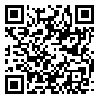Mon, Feb 9, 2026
| فارسی
Volume 16, Issue 2 (Summer 2014)
Advances in Cognitive Sciences 2014, 16(2): 1-10 |
Back to browse issues page
Download citation:
BibTeX | RIS | EndNote | Medlars | ProCite | Reference Manager | RefWorks
Send citation to:



BibTeX | RIS | EndNote | Medlars | ProCite | Reference Manager | RefWorks
Send citation to:
Arianakia E, Hasani J. Impulsivity And Cognitive Emotion Regulation Strategies In Patients With Bipolar- And Major Depressive Disorders. Advances in Cognitive Sciences 2014; 16 (2) :1-10
URL: http://icssjournal.ir/article-1-225-en.html
URL: http://icssjournal.ir/article-1-225-en.html
1- MSc, Department of Psychology, Faculty of Psychology and Educational Sciences, Kharazmi University, Tehran, Iran.
2- PhD, Assistant Professor, Department of Clinical Psychology, Faculty of Psychology and Educational Sciences, Kharazmi University, Tehran, Iran.
2- PhD, Assistant Professor, Department of Clinical Psychology, Faculty of Psychology and Educational Sciences, Kharazmi University, Tehran, Iran.
Abstract: (4611 Views)
Introduction: The aim of the present study was to examine the impulsivity and cognitive emotion regulation strategies among patients with bipolar- and major depressive disorders.
Method: This investigation recruited 50 patients including 25 patients with bipolar disorder (11 females, and 14 males) and 25 patients with major depression (15 females, and 10 males), who presented to Imam Hossein Psychiatric Center, using the convenience sampling method. Our control group comprised 25 healthy participants (13 females, and 12 males) matched for age, education and marital status to patients group. To collect data, Cognitive Emotion Regulation Questionnaire (CERQ-short) and Barratt Impulsiveness Scale (BIS-11), were administered.
Results: Our findings showed a higher score in both patient groups than the healthy controls with regard to attentional/cognitive impulsivity, motor impulsivity and non-planning. Meanwhile, there were no significant differences in such indices between the two patient groups. In addition, both patient groups scored higher than healthy controls in maladaptive cognitive emotion regulation strategies including self-blame, rumination and catastrophizing. Whereas, there were no significant differences in other-blaming and acceptance strategies among the three groups. In adaptive emotion regulation strategies of refocus-on-planning, positive reappraisal, putting into Perspective and positive refocusing there were significant differences amongst the three groups.
Conclusion: These findings reemphasize on the importance of the role of the impulsivity and cognitive emotion regulation strategies in bipolar- and major depressive disorders
Method: This investigation recruited 50 patients including 25 patients with bipolar disorder (11 females, and 14 males) and 25 patients with major depression (15 females, and 10 males), who presented to Imam Hossein Psychiatric Center, using the convenience sampling method. Our control group comprised 25 healthy participants (13 females, and 12 males) matched for age, education and marital status to patients group. To collect data, Cognitive Emotion Regulation Questionnaire (CERQ-short) and Barratt Impulsiveness Scale (BIS-11), were administered.
Results: Our findings showed a higher score in both patient groups than the healthy controls with regard to attentional/cognitive impulsivity, motor impulsivity and non-planning. Meanwhile, there were no significant differences in such indices between the two patient groups. In addition, both patient groups scored higher than healthy controls in maladaptive cognitive emotion regulation strategies including self-blame, rumination and catastrophizing. Whereas, there were no significant differences in other-blaming and acceptance strategies among the three groups. In adaptive emotion regulation strategies of refocus-on-planning, positive reappraisal, putting into Perspective and positive refocusing there were significant differences amongst the three groups.
Conclusion: These findings reemphasize on the importance of the role of the impulsivity and cognitive emotion regulation strategies in bipolar- and major depressive disorders
Keywords: Impulsivity, Cognitive Emotion Regulation Strategies, Bipolar disorder, Major Depressive Disorder.
Type of Study: Research |
Subject:
Special
Received: 2013/08/16 | Accepted: 2013/12/16 | Published: 2014/06/23
Received: 2013/08/16 | Accepted: 2013/12/16 | Published: 2014/06/23
Send email to the article author
| Rights and permissions | |
 |
This work is licensed under a Creative Commons Attribution-NonCommercial 4.0 International License. |



